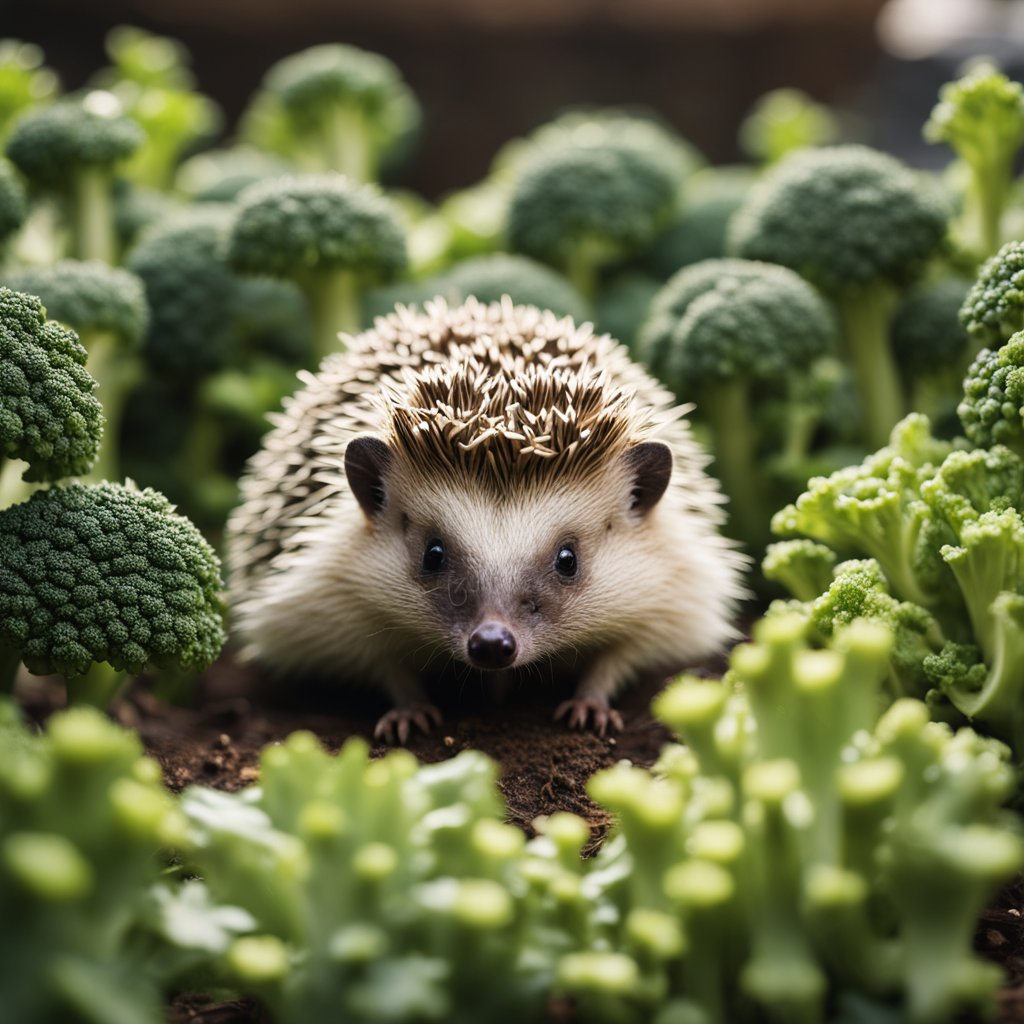Can Hedgehogs Eat Broccoli? A Comprehensive Guide to Hedgehog Nutrition
If you’re a hedgehog owner, you may be wondering what kinds of foods your pet can safely eat. While hedgehogs are primarily insectivores, they can also eat a variety of fruits and vegetables as part of a balanced diet. One vegetable that you may be curious about is broccoli. So, can hedgehogs eat broccoli?
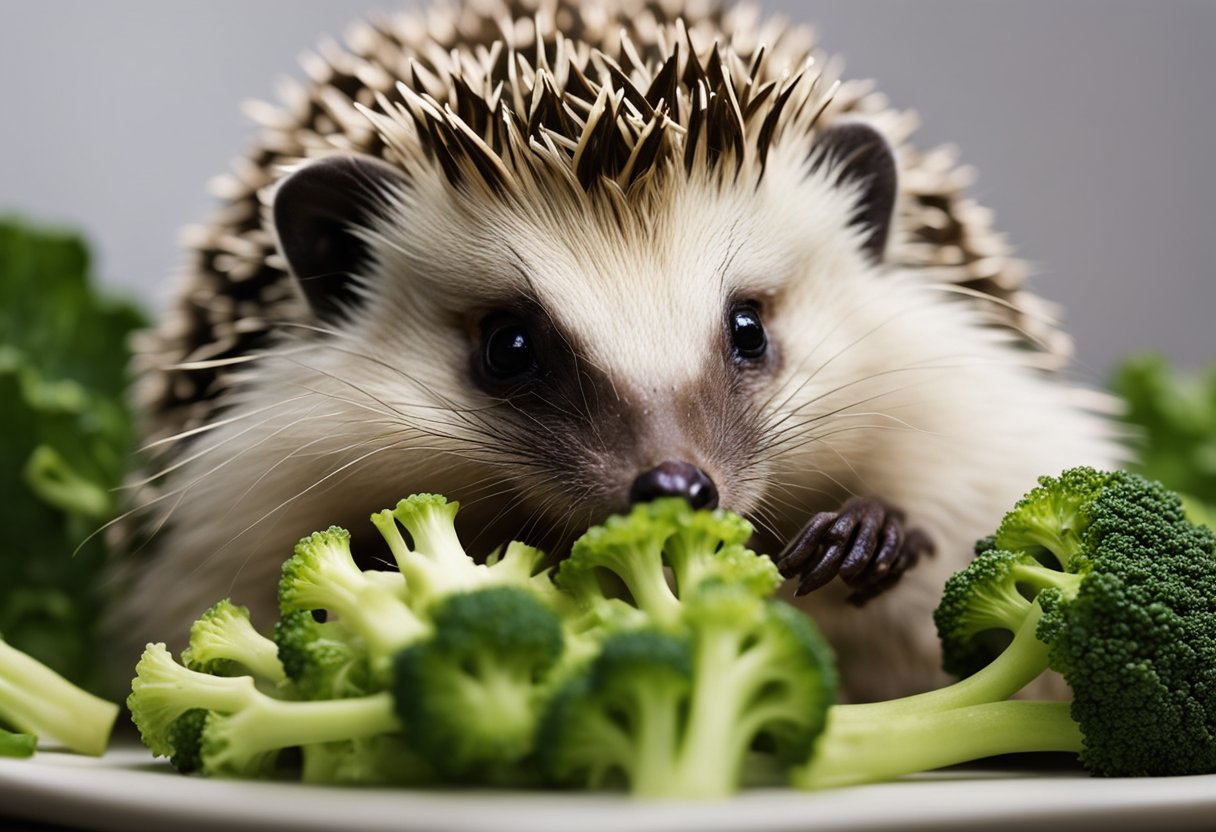
The answer is yes, hedgehogs can eat broccoli. In fact, broccoli is a great source of vitamins and nutrients for your pet. However, it’s important to prepare the broccoli properly before feeding it to your hedgehog. You should cut it into small pieces and either steam or cook it without any seasoning. Raw broccoli can be difficult for hedgehogs to digest, so it’s best to avoid feeding it to them.
Key Takeaways
- Hedgehogs can eat broccoli as part of a balanced diet.
- Broccoli should be cut into small pieces and cooked or steamed before feeding to hedgehogs.
- Raw broccoli should be avoided as it can be difficult for hedgehogs to digest.
Hedgehog Dietary Basics
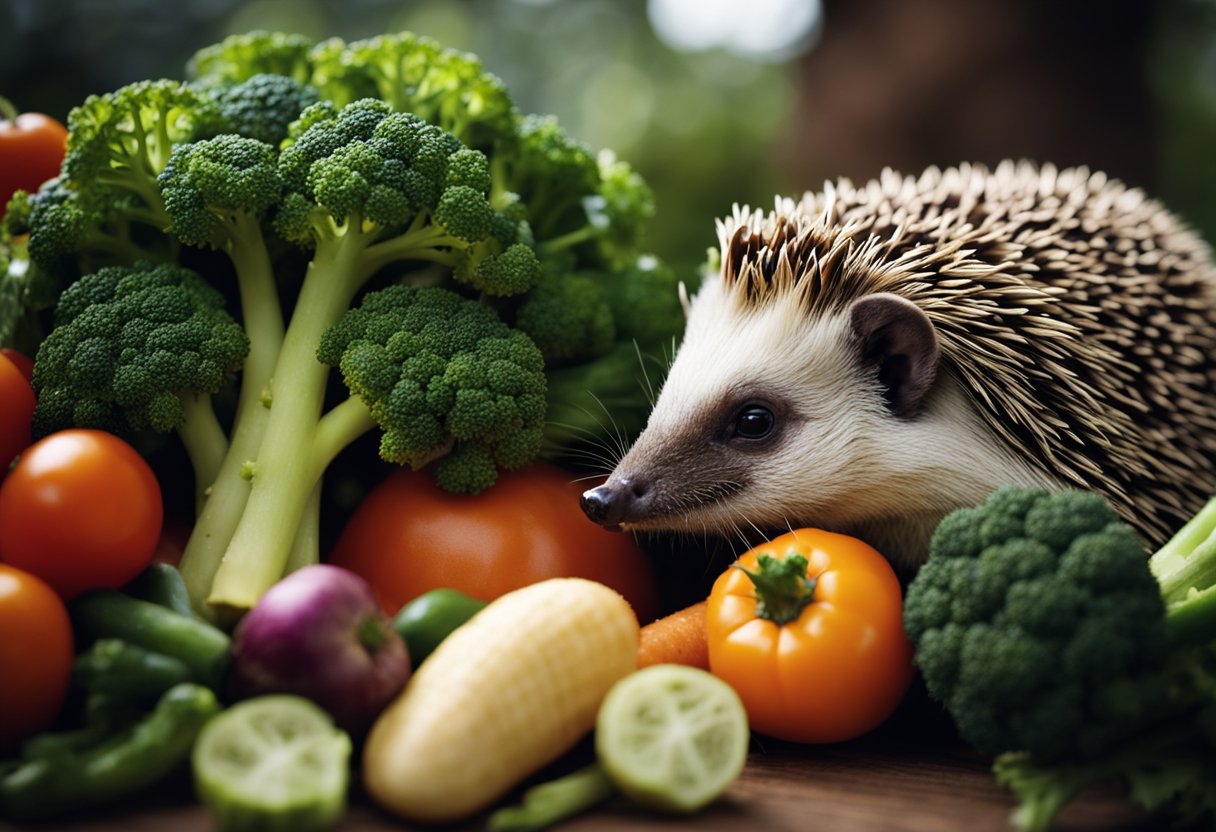
Hedgehogs are omnivores, which means they eat both plants and animals. In the wild, they feed on insects, snails, worms, and other small creatures. They also eat fruits, vegetables, and seeds. As a pet owner, it is essential to provide your hedgehog with a balanced diet that meets their nutritional needs.
Nutritional Needs of Hedgehogs
Hedgehogs require a diet that is high in protein, low in fat, and rich in fiber. They need a variety of nutrients, including vitamins and minerals, to stay healthy. A diet that is deficient in any of these nutrients can lead to health problems.
Here are some essential nutrients that hedgehogs need:
- Protein: Hedgehogs require a diet that is high in protein. Good sources of protein include insects, lean meat, and eggs.
- Fiber: Hedgehogs need fiber to aid in digestion. Good sources of fiber include fruits and vegetables.
- Vitamins: Hedgehogs require a variety of vitamins, including vitamin A, vitamin D, and vitamin E. These vitamins are essential for maintaining healthy skin, eyes, and immune system.
- Minerals: Hedgehogs require minerals such as calcium and phosphorus to maintain healthy bones.
Risks of Feeding Hedgehogs Human Food
While hedgehogs can eat a variety of fruits and vegetables, it is essential to avoid feeding them certain human foods. Some foods can be toxic to hedgehogs and can cause health problems. Here are some foods to avoid:
- Chocolate: Chocolate contains theobromine, which is toxic to hedgehogs.
- Dairy: Hedgehogs are lactose intolerant and cannot digest dairy products.
- Nuts: Nuts are high in fat and can cause digestive problems.
- Onions and garlic: Onions and garlic can damage a hedgehog’s red blood cells.
It is crucial to research and understand what foods are safe for your hedgehog to eat. Broccoli is a safe and healthy food for hedgehogs, as it is rich in fiber and contains antioxidants called flavonoids that have anti-inflammatory benefits [1]. However, it is best to cut it up into small pieces before giving it to your hedgehog for easier digestion. Cooked or steamed broccoli is the safest way to feed it to your hedgehog, and avoid raw broccoli [2].
Broccoli and Hedgehogs
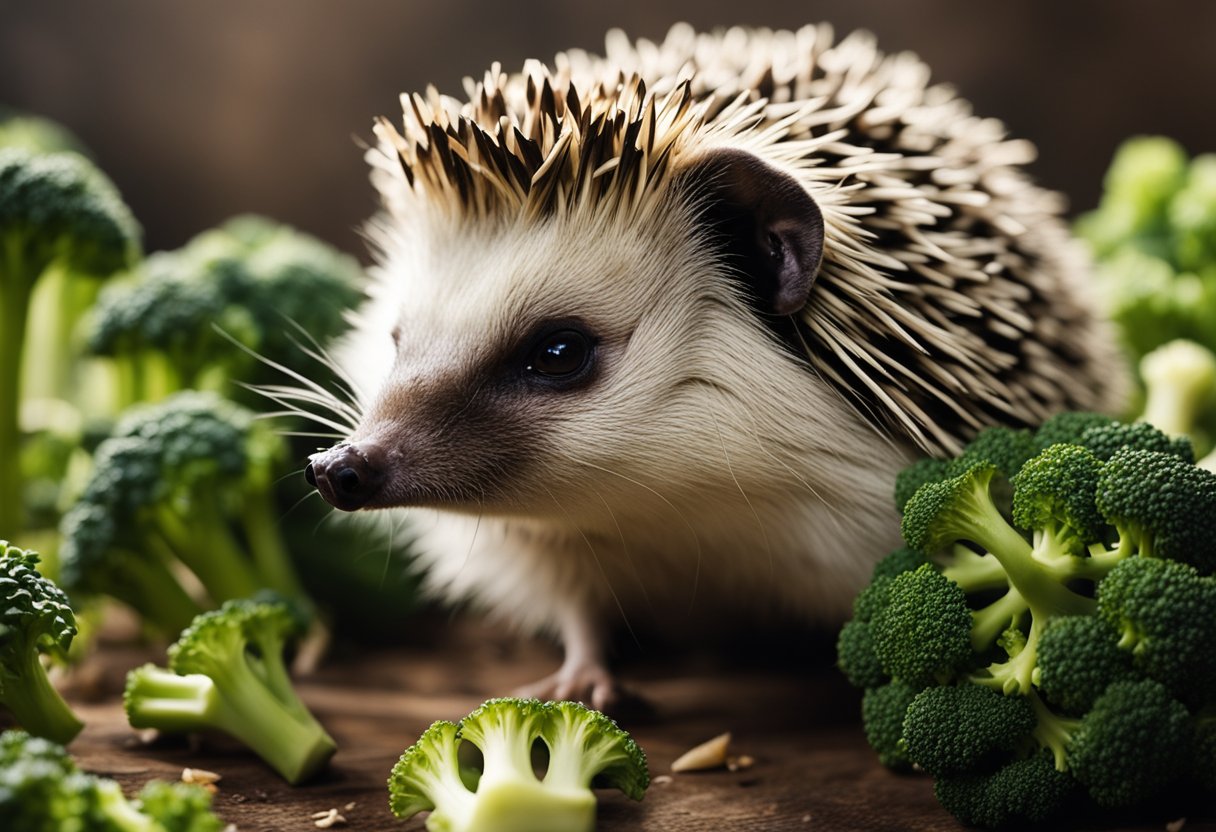
If you are a hedgehog owner, you may wonder if your pet can eat broccoli. The answer is yes! Broccoli is a safe and healthy food for hedgehogs, and it can provide them with many essential nutrients.
Health Benefits of Broccoli for Hedgehogs
Broccoli is a great source of vitamins and minerals that can benefit your hedgehog’s health. It contains high levels of vitamin C, which helps boost the immune system and prevent illness. Broccoli is also rich in vitamin A, which is essential for good eyesight and healthy skin.
In addition, broccoli is a good source of fiber, which can aid in digestion and prevent constipation. It also contains calcium and potassium, which are important minerals for bone health.
How to Safely Introduce Broccoli
When introducing broccoli to your hedgehog’s diet, it is important to do so gradually. Start by offering a small piece of cooked broccoli, and watch for any signs of digestive upset, such as diarrhea or vomiting. If your hedgehog tolerates the broccoli well, you can gradually increase the amount you offer.
It is important to note that hedgehogs should only be given cooked broccoli, as raw broccoli can be difficult to digest and may cause digestive upset. Additionally, it is important to avoid seasoning the broccoli, as hedgehogs should not be given any foods that contain salt, sugar, or spices.
Portion Control and Frequency
While broccoli is a healthy food for hedgehogs, it should be offered in moderation. Too much broccoli can lead to digestive upset and may cause your hedgehog to become overweight.
As a general rule, broccoli should make up no more than 10% of your hedgehog’s diet. Offer small pieces of cooked broccoli no more than once or twice a week, and monitor your hedgehog’s weight and overall health to ensure that they are maintaining a healthy balance.
In conclusion, broccoli can be a healthy and nutritious addition to your hedgehog’s diet. By introducing it slowly and in moderation, you can provide your pet with the essential vitamins and minerals they need to thrive.
Resources
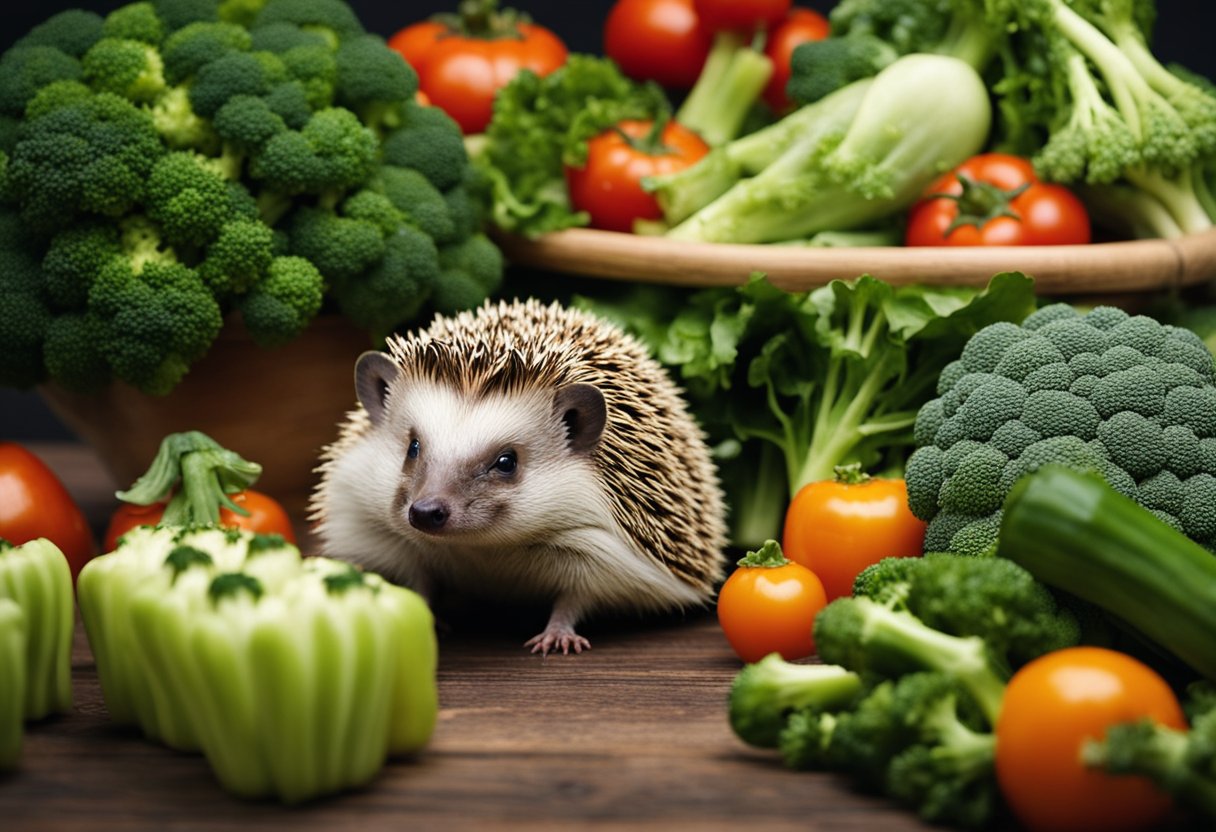
If you’re considering adding broccoli to your hedgehog’s diet, it’s important to first do your research and understand the potential benefits and risks. Here are some resources that can help you make an informed decision:
- Can Hedgehogs Eat Broccoli? (How To Do It Safely): This article provides a comprehensive overview of the nutritional benefits of broccoli for hedgehogs, as well as tips for safely incorporating it into their diet.
- List of 60+ Vegetables Your Hedgehog Can/Cannot Eat!: This resource provides a detailed list of vegetables that are safe for hedgehogs to eat, including broccoli. It also includes information on the potential risks associated with certain vegetables, such as bloating and bladder stones.
- Can Hedgehogs Eat Broccoli? What You Need to Know!: This article offers tips for preparing broccoli for your hedgehog, including cutting it into small pieces and avoiding seasoning. It also emphasizes the importance of feeding broccoli in moderation.
When it comes to feeding your hedgehog, it’s always best to consult with a veterinarian or other qualified animal care professional. They can help you determine the best diet for your pet based on their individual needs and preferences.
In addition to the resources listed above, there are many other online forums and communities where hedgehog owners share tips and advice on feeding and caring for their pets. Just be sure to approach these resources with a critical eye and verify any information you come across with reputable sources.
Conclusion
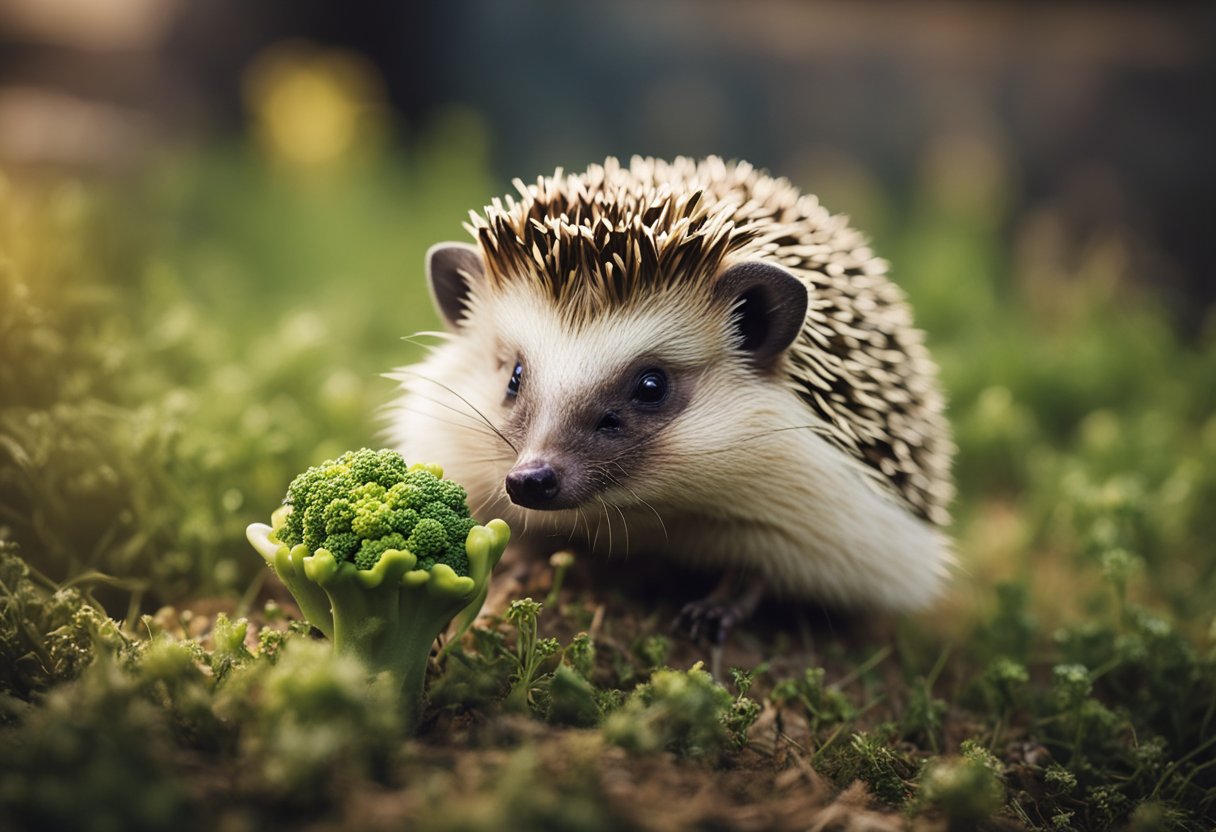
In conclusion, broccoli can be a safe and healthy addition to a hedgehog’s diet when given in moderation. As omnivores, hedgehogs require a varied diet that includes a mix of protein, carbohydrates, and fiber.
Broccoli is a good source of vitamins and minerals, including vitamin C, calcium, and iron. However, it should not be the main staple of a hedgehog’s diet as it can cause digestive issues when consumed in large quantities.
When introducing broccoli to your hedgehog’s diet, start with small amounts and monitor their reaction. Some hedgehogs may not like the taste or texture of broccoli, while others may enjoy it as an occasional treat.
It is important to note that while broccoli is safe for hedgehogs to eat, there are other vegetables and fruits that are better suited to their nutritional needs. Some examples include carrots, peas, green beans, and apples.
Overall, offering a balanced and varied diet to your hedgehog is the best way to ensure their health and well-being. Consult with a veterinarian or a hedgehog expert for more information on the appropriate diet for your pet.
Frequently Asked Questions
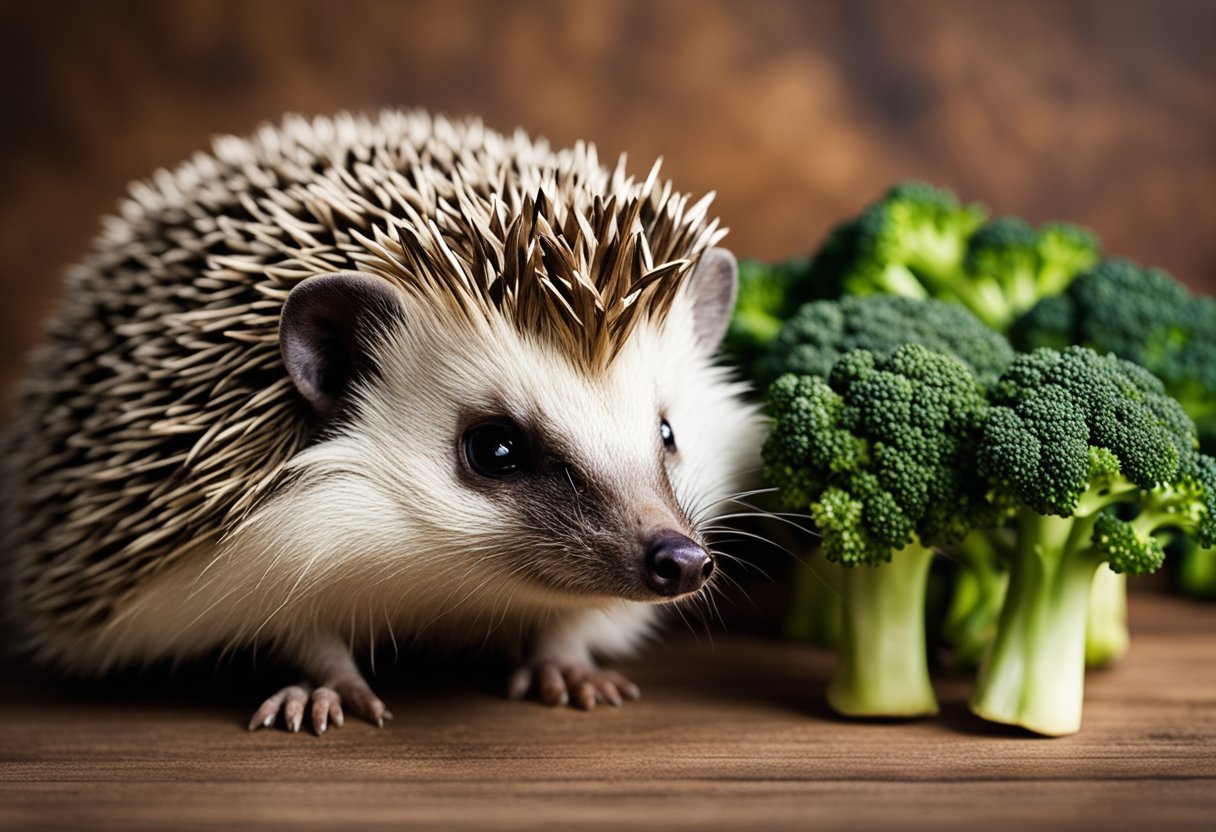
What types of vegetables are safe for hedgehogs to consume?
Hedgehogs can safely consume a variety of vegetables, including broccoli, carrots, green beans, sweet potatoes, and peas. These vegetables are a great source of fiber, vitamins, and minerals that can help keep your hedgehog healthy. However, it is important to introduce new vegetables slowly and in small amounts to avoid digestive upset.
How often can hedgehogs have vegetables in their diet?
Vegetables should only make up a small portion of a hedgehog’s diet, around 10% to 15%. You can offer your hedgehog vegetables once or twice a week in small amounts. It is important to remember that hedgehogs are primarily insectivores and require a diet that is high in protein.
Are there any risks associated with feeding broccoli to hedgehogs?
Broccoli is generally safe for hedgehogs to consume in moderation. However, it is important to avoid feeding your hedgehog raw broccoli, as it can be difficult for them to digest. Steamed or boiled broccoli is a better option. Additionally, broccoli contains goitrogens, which can interfere with thyroid function if consumed in large amounts. Therefore, it is important to feed broccoli to your hedgehog in moderation.
What should be avoided when feeding hedgehogs?
Hedgehogs should not be fed foods that are high in fat, salt, or sugar. Foods that are toxic to hedgehogs include chocolate, caffeine, avocado, and grapes. It is also important to avoid feeding your hedgehog any food that is spoiled or past its expiration date.
Which fruits are hazardous to hedgehogs?
There are several fruits that are hazardous to hedgehogs, including citrus fruits, cherries, and grapes. These fruits contain high levels of acid or sugar, which can cause digestive upset or other health issues in hedgehogs. Additionally, fruits that contain pits or seeds should be avoided, as these can be a choking hazard.
Can providing a variety of vegetables benefit a hedgehog’s health?
Providing a variety of vegetables can benefit a hedgehog’s health by providing them with a range of vitamins and minerals. However, it is important to introduce new vegetables slowly and in small amounts to avoid digestive upset. Additionally, it is important to remember that vegetables should only make up a small portion of a hedgehog’s diet, and that they require a diet that is high in protein.
